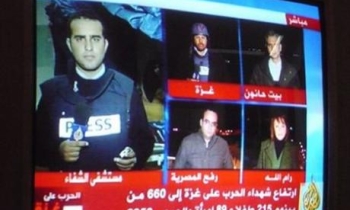Afghan officials banned journalists Sunday from shooting photos and video or conducting interviews near the site where talks on the fate of 21 South Korean hostages are being held — new restrictions a day after two Taliban leaders held a news conference there, the Associated Press (AP) has reported.

Marajudin Pathan, the governor of Ghazni province where the hostages were kidnapped on July 19, said the ban was put in place during the negotiations because the Taliban might exploit the media spotlight. "It's because the Taliban will take advantage and show off, so we don't want to give them that chance," Pathan said. "This is a terrorist group."
In an extraordinary scene that hasn't happened in years in Afghanistan, print journalists and camera crew crowded around two top Taliban leaders who gave an impromptu news conference outside the Afghan Red Crescent office on Saturday. Veteran reporters in Afghanistan said the Taliban leaders' news conference was the first since the fall of the hardline militants in late 2001.
Mullah Qari Bashir and Mullah Nasrullah travelled to the city of Ghazni after being given an assurance of safe passage by the Afghan government. On the second day of hostage talks, they told reporters they thought the negotiations were going well and that they expected that the hostages would be released soon.
Pathan said the media ban would be lifted as soon as the hostage talks are over — "maybe within the next two days." He said the ban applied only to the area around the Red Crescent office, where the talks are being held, though journalists reported that police and intelligence officials told them the ban applied to the entire province.
Mujeeb Khalwatgar, the director of the Afghanistan Press Club, said such a media ban went against the country's constitution and a recently passed media law. "When the government provides an opportunity for two sides to sit together for negotiations, nothing should be hidden from the people," he said. "The intelligence service has no right to prevent them from carrying out their work."
Khalwatgar said the government can prevent journalists from revealing information that would harm national security, but that wasn't the case with the hostage negotiations. "Why didn't they just prevent the Taliban from talking to the media yesterday?" he asked.
Pathan said he was "100 percent for democratic order" but that "sometimes you have no choice." He said the punishment for journalists breaking the order would be deportation from the province. Many journalists in Ghazni travelled to the region from Kabul to cover the hostage talks.
A journalist in Ghazni said that an intelligence officer threatened reporters with arrest if they reported on the media ban. A spokesman for Afghanistan's Interior Ministry said he was not aware of the ban and would look into it.
Twenty-three South Koreans from a church group who intended to work as aid workers were kidnapped in Ghazni on July 19. Two male hostages have already been shot dead. Talks between the Taliban leaders and South Korean officials began Saturday.









